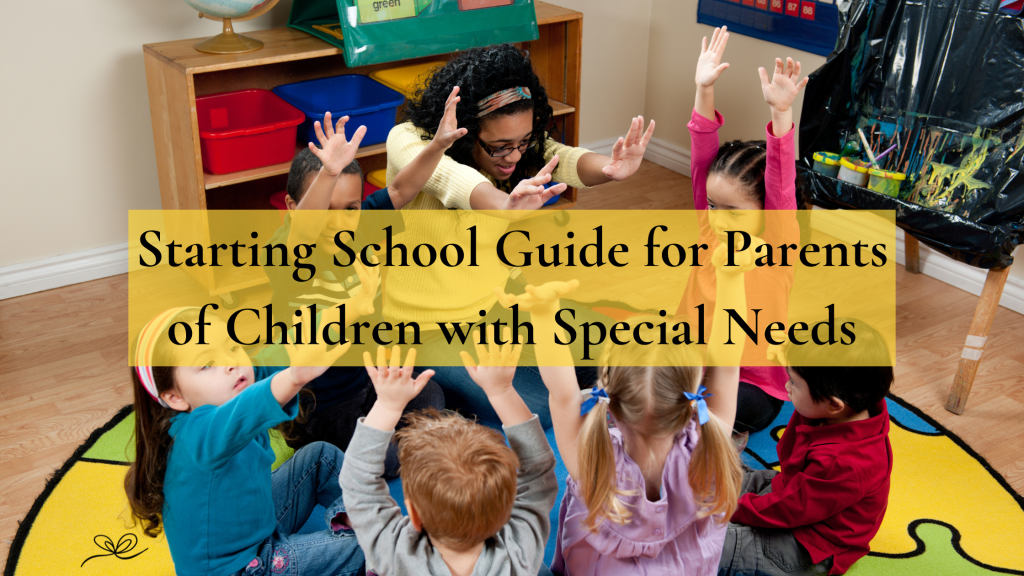Starting school is an exciting milestone for any child, but it can be both exhilarating and daunting for parents of children with special needs. For most of these parents, the idea of drastically changing their child’s routine is extremely overwhelming. It’s completely natural to have concerns about how your child will adapt to a new environment, interact with peers, and still receive the level of care and support they need. Although this journey may be a first for you and your child, you are not alone. Parents, caregivers, and educators from all over have shared their experiences in hopes to guide first time parents and students on how to prepare for this new stage in life.
Prepare for the Transition
This step is easier said than done, of course. However, it is crucial that you find ways to create as smooth a transition as possible. Here are a few steps to consider:
- Visit the school: Arrange a visit to the school without your child first if you can. This will help you get a feel for the environment and the layout. Find out where your child will spend most of their time and keep track of names of teachers and other staff members that will be interacting with your child. Then when you visit with your child, you will be more comfortable with your surroundings. During this visit, they can meet their teachers, see their classroom, and even explore the playground. The goal is to help reduce anxiety and create a sense of familiarity.
- Establish open communication: Reach out to your child’s teachers and administration to discuss your child’s specific needs, challenges, share any relevant documentation, and any special accommodations you feel they need to be aware of. This also includes communication with your child. Talk to them about what school is like, show them pictures, and read books about starting school.
- Create a visual schedule: Of course, if your child is visually impaired, you will need to change your approach to meet their needs. Visual schedules are a great tool to help children understand and anticipate their daily routines. In doing so, you will outline the activities they will engage in throughout the school day, including arrival, class schedule, breaks, lunch, playtime, and departure.
- Develop social skills: Encourage your child’s social skills development by organizing playdates with other children, enrolling them in social skills groups, or participating in community activities. By implementing opportunities for social interaction, this will hopefully help them feel more comfortable around their classmates.
- Prepare for sensory needs: If your child has sensory sensitivities, communicate this to your child’s teachers. Find out if the school provides specific accommodations, such as noise-canceling headphones, fidget tools, or quiet spaces for breaks.
- Gradually adjust their routine: Chances are your child already has a routine in place. Their new school schedule will interfere with some of their normal day to day activities. Whether it’s a bedtime adjustment or even mealtimes, it is helpful to slowly start easing them into these new routines before school starts if you can.

Build a Support Network
As a parent of a first-time student, there will be many firsts for you and your child as you begin this journey. Don’t be afraid to seek help from others. Here are a few ways you can do this:
- Connect with other parents: Look for parent support groups and even online communities where you can share experiences, advice, and resources.
- Collaborate with educators: Most schools have a school app providing you with access to your child’s teachers and administration. Regular communication and collaboration will ensure that everyone is on the same page and working towards the same goals to provide the best support for your child.
- Engage with professionals: Consult with therapists, counselors, or other professionals who can provide guidance and support during this transition.
Advocate for Your Child
As their parent, you are your child’s best advocate. You know them better than anyone and have their best interests at heart at all times. Below are some tips for effective advocacy:
- Understand your child’s rights: Familiarize yourself with laws, policies, and regulations that protect your child’s rights to an inclusive education. Learn more about your parental rights in our blog: What Are My Parental Rights Under IDEA
- Attend Individualized Education Program (IEP) meetings: Be active in your child’s IEP meetings. Share your insights, concerns, and aspirations for your child’s education.
- Communicate openly: Without sounding like a broken record, it cannot be stressed enough that communication is key. By keeping an open line and having regular check-ins, you can address issues promptly and ensure your child’s educational experience is tailored to their needs.

Celebrate Progress and Embrace Challenges
This milestone will feel like an emotional rollercoaster at times, but it’s important to celebrate your child’s achievements along the way, no matter how small. Include those close to your child so they can acknowledge their efforts and encourage them. Progress will not always be ideal and challenges are almost inevitable. Let these moments be opportunities for growth and learning, both for you and your child.
Starting School is an Adventure, enjoy it!
We hope this starting school guide helps your household get ready for the upcoming school year. It is going to be stressful regardless of how many steps you take to prepare, but it is still a rewarding experience. Your child will have good days and bad days, as will you. So, set realistic goals and focus more on the journey instead of the obstacles that get in the way. At the end of the day, the most important thing is that your child feels loved, and you know their love language better than anyone else!





